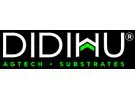"The biggest challenge we face as growers is water scarcity, and the coconut fiber substrate has helped me reduce the amount of water I use. In this way, the strawberries are grown in a sustainable way, and it also helps me to reduce the amount of agrochemicals." Speaking is Jorge Narváez with N&H Berries. The 12 ha Mexican strawberry company has been using bags of coconut fiber for two years, and for the past few months, he's also been using coconut fiber in his gutter system. He grows on Didihu substrates. This Mexican supplier is now expanding its assortment with peat moss.

Jorge explains how he used to grow in soil. "But we are gradually converting the acres to hydroponics because we are looking for cost savings and higher production. We are very focused on sustainability", he says.
In doing so, the choice of a substrate is of high importance. "We look for the substrate to have thick fibers that allow us to have enough oxygenation in the plants, which is something that strawberries love. Another thing we look for is the homogeneity of the substrate so that the plants have the same conditions, this helps the irrigation system to be very efficient", he explains.

Jorge has been growing with substrates of Didihu since their start in the hydroponic business. "Our experience has been very positive since we contacted Didihu. Every time their consultant visits our field, he is very interested in reviewing the project and evaluating the fiber. They give us a lot of follow-up throughout the project, and the human factor is key."

In addition to their coco substrates, the Mexican company offers Pothu SQ pots and agrotextiles. "The main challenge for growers is how to do more with less in a sustainable way," says David Cadena, CMO of DIDIHU. "Today's environmental challenges force us to adopt responsible practices in all areas, including agriculture, to ensure a successful future for our country and our planet. Challenges caused by climatic factors, including increased water demand due to population growth, industry and inefficient agricultural practices. Our substrates are helping the industry meet the challenge of producing more food in a sustainable way."
He adds the industry is in constant growth. "And for those of us in the supply industry, there are undoubtedly many opportunities to continue to improve the quality of the food that is produced. People are increasingly demanding healthy, safe food on their tables that has been produced with less impact on the environment, so there is still a lot of work to be done on our part."
Recently, Didihu added peat moss to their assortment, produced in Latvia. "We have been with a nationwide campaign doing an exercise of yield per tray and root development in seedlings. The results are amazing; we have testimonials and have documented the biological effectiveness of this material. It was a natural step for us to integrate from the nursery to the productive phase of the plants with our coco substrate solutions," adds Raul Mercado, CEO of Didihu.

"We have been with a nationwide campaign doing an exercise of yield per tray and root development in seedlings. The results are amazing; we have testimonials and have documented the biological effectiveness of this material. It was a natural step for us to integrate from the nursery to the productive phase of the plants with our coco substrate solutions," adds Raul Mercado, CEO of the company.
For more information:
Didihu AgTech Substrates
Erandy Rizo
Tel.: +52 668 172 4111
erandyr@wearedidihu.com
wearedidihu.com
